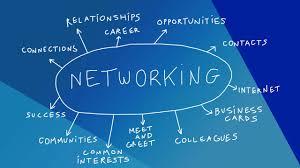Networking: A Comprehensive Guide to Building Connections and Enhancing Opportunities
Introduction
Networking is a fundamental aspect of both personal and professional development, encompassing the practice of establishing and nurturing relationships that can facilitate the exchange of information, resources, and opportunities. In an increasingly interconnected world, effective networking can significantly impact one’s career, business ventures, and personal growth. This guide will explore the various facets of networking, including its importance, strategies for effective networking, the different types of networking, and tips for overcoming common challenges.
The Importance of Networking
- Career Advancement
Networking plays a critical role in career advancement. By connecting with professionals in your field, you gain access to job opportunities, mentorship, and industry insights. Many jobs are filled through referrals rather than traditional job postings, highlighting the value of having a strong network.
- Knowledge Sharing
Networking provides a platform for knowledge sharing. Engaging with others allows you to exchange ideas, best practices, and industry trends. This can be particularly beneficial in rapidly evolving fields such as technology and healthcare, where staying current is essential.
- Building Confidence
Networking helps build confidence, especially for those who may be introverted or new to a particular industry. Regularly interacting with others fosters communication skills, enhances social competence, and encourages self-expression.
- Opportunities for Collaboration
Networking can lead to collaboration opportunities. By connecting with like-minded individuals or organizations, you can work together on projects, share resources, and achieve common goals. Collaborative efforts often yield innovative solutions and expanded reach.
- Support and Community
A strong network provides emotional and professional support. Whether you are facing challenges in your career or seeking guidance on personal matters, your network can offer advice, encouragement, and assistance.
Types of Networking
Networking can take various forms, each serving different purposes and audiences:
- Professional Networking
Professional networking focuses on building relationships within a specific industry or profession. This type of networking often occurs at industry conferences, workshops, and professional associations. It is essential for career growth, mentorship opportunities, and access to job leads.
- Social Networking
Social networking involves connecting with individuals on a personal level, often through social media platforms like Facebook, Instagram, and LinkedIn. While the primary focus may be on personal relationships, social networking can also lead to professional opportunities.
- Informal Networking
Informal networking occurs naturally through everyday interactions. This can happen at social events, community gatherings, or even casual conversations. These spontaneous interactions can often lead to valuable connections and insights.
- Online Networking

With the rise of digital communication, online networking has become increasingly important. Platforms like LinkedIn, Twitter, and industry-specific forums allow individuals to connect with others globally. Online networking offers flexibility and accessibility, making it easier to engage with a broader audience.
- Strategic Networking
Strategic networking is a targeted approach that involves identifying key individuals or groups that align with your professional goals. This can include reaching out to industry leaders, potential mentors, or decision-makers within organizations. Strategic networking requires planning and research to identify the right people to connect with.
Strategies for Effective Networking
To maximize the benefits of networking, consider the following strategies:
- Set Clear Goals
Before attending networking events or reaching out to others, establish clear objectives. Determine what you hope to achieve, whether it’s finding a mentor, learning about job opportunities, or expanding your knowledge in a specific area.
- Be Authentic
Authenticity is crucial in networking. People are more likely to connect with you if you are genuine and sincere in your interactions. Focus on building meaningful relationships rather than just transactional connections.
- Listen Actively
Effective networking involves active listening. When engaging with others, show genuine interest in their experiences and insights. Ask open-ended questions and encourage them to share their thoughts. This creates a more engaging conversation and fosters a deeper connection.
- Follow Up
Following up after networking interactions is essential. Send a brief thank-you message or connect on social media to reinforce the relationship. Following up shows appreciation and keeps you on their radar for future opportunities.
- Attend Events and Conferences
Participating in industry events, conferences, and workshops provides valuable networking opportunities. These settings allow you to meet professionals in your field, learn from experts, and engage in discussions about current trends and challenges.
- Leverage Social Media
Utilize social media platforms, especially LinkedIn, to connect with professionals in your industry. Share relevant content, engage with others’ posts, and participate in discussions to increase your visibility and credibility.
- Join Professional Associations

Becoming a member of professional associations related to your field can enhance your networking efforts. These organizations often provide access to exclusive events, resources, and networking opportunities with industry leaders.
- Mentorship Programs
Seek out mentorship programs within your industry. A mentor can provide valuable insights, guidance, and introductions to others in their network. Being a mentor yourself can also enhance your networking by expanding your connections.
Overcoming Networking Challenges
Networking can be intimidating, especially for those who are introverted or new to a field. Here are some common challenges and tips for overcoming them:
- Fear of Rejection
The fear of rejection can deter individuals from reaching out to others. To overcome this fear, remember that networking is a two-way street. Many people are open to connecting and helping others, so approach interactions with a positive mindset.
- Lack of Confidence
Building confidence takes time and practice. Start by attending smaller events or connecting with individuals one-on-one. As you gain experience, your confidence will grow, making networking feel more natural.
- Limited Opportunities
If you find yourself in a situation with limited networking opportunities, consider creating your own. Host events, webinars, or discussion groups to bring people together around shared interests or professional topics.
- Navigating Small Talk

Small talk can be challenging, but it’s a crucial aspect of networking. Prepare some conversation starters related to current events, industry trends, or common interests. Asking open-ended questions can help facilitate deeper conversations.
- Maintaining Connections
It’s easy to lose touch with connections over time. Make an effort to periodically reach out, whether through social media, email, or casual meet-ups. Sharing interesting articles or updates can keep the conversation going.
The Role of Technology in Networking
Technology has transformed the networking landscape, making it easier to connect and engage with others. Here are some ways technology enhances networking:
- Social Media Platforms
Social media platforms, particularly LinkedIn, have become essential tools for professional networking. Users can showcase their skills, share content, and connect with others in their industry, creating a dynamic online presence.
- Virtual Networking Events
The rise of virtual networking events has made it possible to connect with professionals from around the globe. Webinars, online conferences, and virtual meet-ups offer flexible opportunities to engage without geographical constraints.
- Networking Apps
Several mobile applications facilitate networking by connecting users with shared interests or professional goals. These apps can help you discover networking events and meet new people in your field.
- Webinars and Online Courses
Participating in webinars and online courses allows you to learn while networking. Engaging with instructors and fellow participants can lead to valuable connections and collaborations.
- Professional Online Communities
Online forums and communities related to your field can be excellent networking resources. Joining these platforms allows you to share insights, ask questions, and connect with industry professionals.
Conclusion
Networking is an invaluable skill that can significantly impact personal and professional growth. By understanding the importance of networking, employing effective strategies, and overcoming common challenges, individuals can build meaningful connections that enhance their opportunities. In today’s interconnected world, leveraging technology and engaging with diverse networks will play a critical role in shaping career trajectories and fostering collaboration. As you embark on your networking journey, remember that building relationships takes time, effort, and authenticity—qualities that will yield lasting rewards in your career and beyond.



